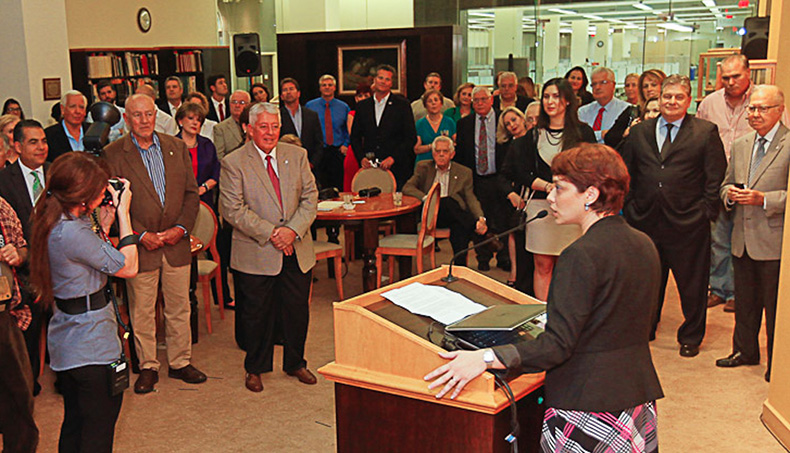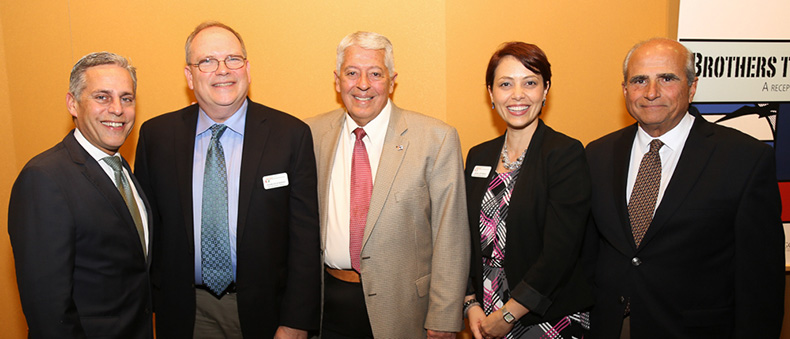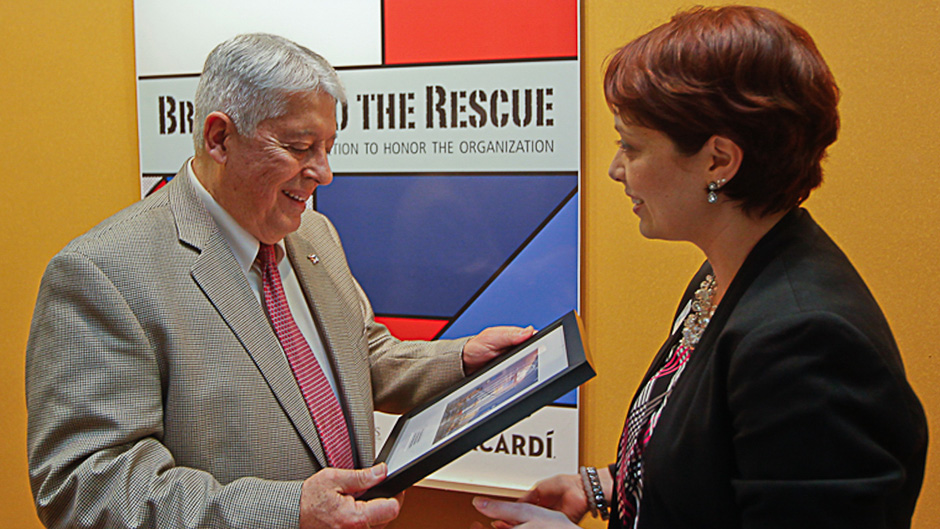The University of Miami Libraries Cuban Heritage Collection recently acquired an archive documenting the activity of Brothers to the Rescue, an organization that carried out over 1,800 search-and-rescue missions between Cuba and the United States during the 1990s. Photographs, video recordings, reports, and other materials comprise the archive and together tell the story of the organization, which saved over 4,200 rafters in the Straits of Florida. The gift is part of Momentum2: The Breakthrough Campaign for the University of Miami.
“The story of the Brothers will forever be part of the larger history that we all share,” said María Estorino, chair of the Cuban Heritage Collection, speaking from a podium at The Roberto C. Goizueta Pavilion during a reception held January 9 to honor former members of the organization. Several volunteer pilots from Brothers to the Rescue, and some of their key supporters, attended the reception, which was sponsored by TD Bank, Bacardi USA, and the Amigos of the Cuban Heritage Collection.
The Brothers founder, José Basulto, spoke at the event, explaining how Brothers to the Rescue operated on behalf of Cuban refugees as well as those who hadn’t left the island. “Much of our role was sending messages of solidarity and love to the Cuban people,” Basulto said.
The organization was founded in 1991 when the news broke of fifteen-year-old Cuban exile Gregorio Perez Ricardo, who died of dehydration mid-journey to the United States. The Brothers, in collaboration with the U.S. Coast Guard, performed search-and-rescue operations throughout the 1990s. They entered a period of decline after February 24, 1996, when Cuban Air Force MiGs shot down two of the organization’s planes and killed four volunteers.
During his speech, Basulto recounted that one aspect of the Brothers’ mission involved the dissemination of media to Cuban citizens promoting nonviolent civil disobedience. “Change must come from within,” Basulto said, describing one instance in which the organization dropped 500,000 leaflets onto the island containing the UN’s Declaration of Human Rights.
Basulto said the organization’s missions were carried out through thousands of small donations, which added up to millions of dollars. “God was on our side,” he said, as he picked out many supporters from the audience and thanked them for their actions that pushed forth the organization’s efforts throughout the 1990s.

CHC Chair María Estorino speaks during the event.
Basulto first contacted Estorino at the Cuban Heritage Collection in 2008 regarding the many boxes and file cabinets he had in storage that—through flight logs, photographs, news clippings, legal records, and audiovisual recordings—documented the work of Brothers to the Rescue. “We were ready to accept the materials then and there, but Basulto was not ready to part with them just yet,” Estorino said.
Five years later, she received another call from Basulto saying he was ready to make the archive accessible to the public. The sixty boxes that make up the archive of the Brothers to the Rescue will soon be made available for research. The next step, Estorino said, is to establish resources for processing the archive—funding for student interns to organize, preserve, and catalog its materials—a cause for which the Libraries is calling for support from the public.
Dean of Libraries Charles Eckman, who also spoke at the event, assured guests that the records are in good hands. “Generations of future historians will benefit from the care and attention that the staff of the University of Miami Libraries and the Cuban Heritage Collection will bring to these important records,” he said.
Basulto says the stories will serve to shed light on the many people involved and their unique place in the organization’s history, as well as the series of events that led to its tragic conclusion. At the end of his speech, Basulto commemorated the services of Armando Alejandre, Jr., Carlos Costa, Pablo Morales, and Mario de la Peña, of the Brothers who lost their lives that day.

José Basulto, center, is surrounded (from left) by his son Felipe Basulto; Dean of Libraries Charles Eckman; CHC Chair María Estorino; UM Trustee and Amigos Board Member José Bared.

